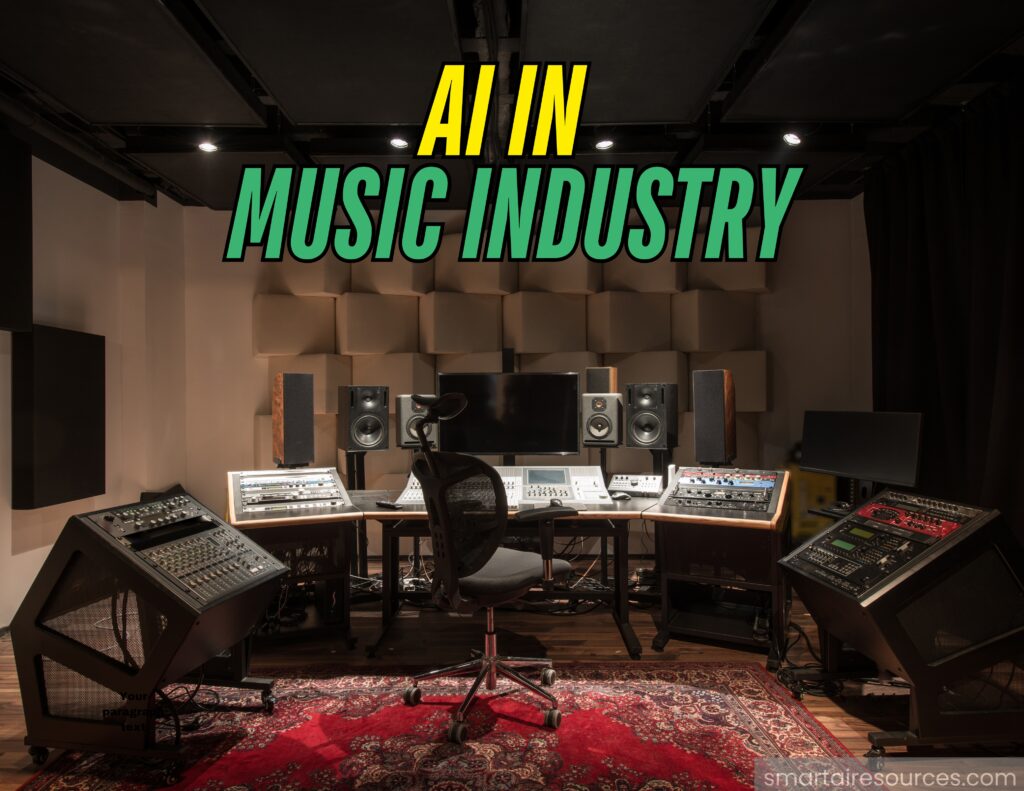
How Has Artificial Intelligence Transformed the Rhythm of the Music Industry?
Artificial intelligence (AI) is at the center of the change that is taking place in the music industry. Music, which was once seen to be a field only for human creation, is now embracing the effectiveness, accuracy, and creativity of AI technologies. We are seeing a new era of music creation, production, and dissemination powered by intelligent algorithms and machines as a result of AI’s growing influence. However, it is still unclear how precisely artificial intelligence has changed the beat of the music business.
In this article, we will explore how AI is reshaping every aspect of the music landscape—from composition and production to distribution and discovery—and what this means for the future of music.
AI: A Composer, Performer, and Producer in the Music Industry
The artistic endeavor of music has a lengthy history and is deeply rooted in human expression. Musicians, composers, and lyricists have poured their emotions, ideas, and experiences into their work to produce melodies, harmonies, and words that resonate with audiences. However, AI is increasingly adding its own unique voice and stretching the boundaries of human creativity.
AI in Music Composition
AI composers were the first significant musical advancement in artificial intelligence. Songwriting by human songwriters is a thing of the past. This area of the industry is evolving because of AI tools like AMPA Music. Amper is an AI-powered music production tool that can create amazing, creative music in a matter of seconds. With just one click, musicians and content producers can now create everything from jazzy tunes to upbeat rock anthems thanks to Amper’s versatility in producing music for a variety of moods and genres.
Traditional composers may feel threatened by this, but human creativity is not being replaced. Instead, AI is here to help. AI allows songwriters to concentrate on the creative elements of honing and customizing their music by automating the time-consuming task of creating melody possibilities. In this sense, rather than competing with human musicians, AI is a potent tool for them.
Democratizing Music Composition
The way AI democratizes music is among its most inventive features. People without any professional musical experience can make their own music utilizing AI technologies like Amper. AI-powered platforms offer the means to create professional-caliber compositions without the need for costly equipment or in-depth musical experience, whether you’re a content creator seeking original background music or an independent filmmaker in need of a soundtrack. Because of this, anyone with a computer and access to AI technology gains power, not just a small group of composers and artists.
In essence, AI is changing the way we interact with music. It’s not just about listening anymore; it’s about creating and personalizing music to fit your individual needs, making music creation more accessible than ever before.
AI and Music Production: A New Era of Sound Quality
The way AI democratizes music is among its most inventive features. People without any professional musical experience can make their own music utilizing AI technologies like Amper. AI-powered platforms offer the means to create professional-caliber compositions without the need for costly equipment or in-depth musical experience, whether you’re a content creator seeking original background music or an independent filmmaker in need of a soundtrack. Because of this, anyone with a computer and access to AI technology gains power, not just a small group of composers and artists.
Beyond just production, artificial intelligence is transforming music consumption and dissemination. In the past, musicians had to depend on record labels to bring their music in front of the public. Labels acted as gatekeepers, selecting artists who could reach a larger audience. However, AI is altering that power dynamic. Thanks to the technology available to them, independent musicians can now immediately reach a global audience with their music, circumventing traditional gatekeepers.
Beyond just production, AI is transforming how music is distributed and consumed. Record labels used to be the only way for musicians to get their music in front of the audience. Labels acted as gatekeepers, deciding which artists would have access to a larger audience. AI, however, is altering that power balance. Thanks to available technologies, independent musicians can now directly reach a global audience with their music, circumventing traditional gatekeepers along the process.
AI and Music Distribution: The Democratization of the Industry
AI is transforming music consumption and dissemination in ways that go beyond creation. In the past, record companies were the only way for musicians to get their music in front of the audience. The musicians who could reach a larger audience were selected by labels, who acted as gatekeepers. But thanks to AI, that power relationship is shifting. Now that they have access to technologies, independent musicians can immediately reach a global audience with their songs, circumventing traditional gatekeepers.
AI is also making it easier to discover new music. Streaming services like Spotify and Apple Music utilize AI-driven recommendation algorithms to suggest songs to consumers based on their listening habits and interests. These algorithms help emerging musicians gain more visibility by suggesting their tracks to potential fans who might not have otherwise heard of them. This is revolutionary for musicians who work for themselves. AI is giving businesses the chance to reach new audiences and grow their fan base without relying on the marketing budgets of traditional labels.
Moreover, AI tools provide artists with valuable insights into their audience’s preferences and listening behavior. This data allows musicians to tailor their marketing strategies and make informed decisions about where to focus their efforts. For instance, they can analyze which tracks are performing well in different regions or which songs have the highest engagement rates, enabling them to optimize their content for maximum impact.
AI and Music Discovery: The Role of Algorithms
The way individuals discover music is also changing as a result of artificial intelligence. More traditional methods of finding new music, such as listening to the radio or hearing recommendations from friends, are being replaced by AI algorithms that make musical recommendations based on individual preferences. AI-powered platforms analyze people’s listening preferences, favorite genres, and even the time of day they listen to music using sophisticated algorithms. Based on this information, the computer then suggests new songs, artists, and genres to help listeners discover new music that fits their tastes.
For musicians, AI-driven recommendation engines are providing an opportunity to reach new fans. Independent artists can now find their music in front of the right audience without spending a dime on advertising. This has helped level the playing field, giving smaller, lesser-known artists the same opportunities to go viral as major-label artists.
The Future of AI in Music: Possibilities and Challenges
As AI advances, it has the potential to revolutionize the music industry. The creation of fully AI-generated albums, live performances by AI-powered avatars, and even cross-border artist collaborations powered by AI are all exciting possibilities for the future of AI in music. The combination of AI and human creativity will lead to new genres and sounds as well as a deeper understanding of music in general.
However, the use of AI in music also raises some important questions. First of all, is music produced by machines truly art? AI can create melodies and lyrics, but can it mimic the human emotions and experiences that make music powerful? Many people believe that AI-generated music lacks the authenticity and emotional depth that human songwriters can offer.
Additionally, there are concerns about the impact of AI on musicians’ livelihoods. With AI taking over many aspects of music production and composition, will human musicians struggle to find work? And what about the ethical implications of using AI to create music? Should AI be credited as a co-creator alongside human musicians, or does the artist deserve all the recognition?
Conclusion
Artificial intelligence is undoubtedly altering the music industry’s pace. From AI-generated compositions to independently produced and shared music, artificial intelligence is transforming the way we create, consume, and interact with music. While the technology presents exciting opportunities, it also raises important questions about the role of human creativity in music. There is no denying that artificial intelligence is here to stay and will continue to influence the music industry more and more. Instead than replacing artists, AI is enhancing their abilities by providing them with powerful instruments that enable them to create music more efficiently and rapidly. It’s evident that the symphony of AI and music has only just begun as we look to the future. Artificial intelligence and human ingenuity working together promises to create a new wave of musical innovation that has the potential to permanently alter how we listen to music.
Therefore, as AI continues to strum the chords of the music industry, producers, fans, and performers alike must welcome the new possibilities while remaining aware of the associated problems and challenges. Music of the future is here, and both people and machines are creating it.
